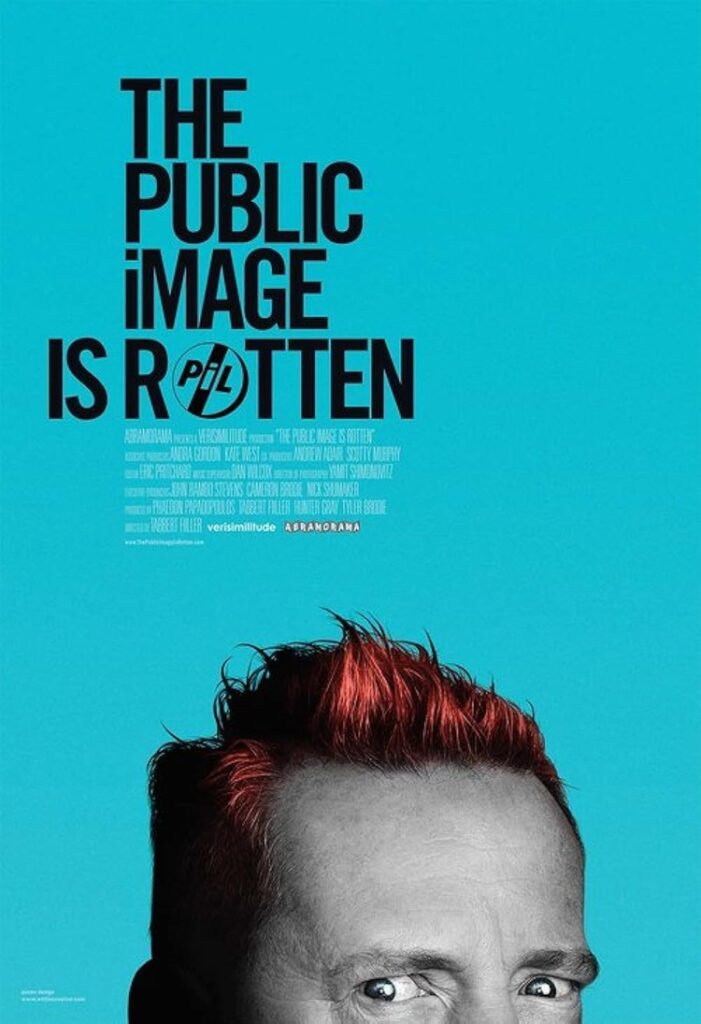
In the aftermath of the Sex Pistols’ demise, the press, particularly in England, probably felt they had heard the last of Johnny “Rotten” Lydon. Instead, the controversial singer returned, as confrontational and dangerous as ever, with an exciting new group, Public Image Ltd. (PiL), that arguably pushed musical boundaries further than the Pistols ever did. Four decades later, The Public Image Is Rotten takes a look back at this original punk’s wild journey.
The film, which was directed by Tabbert Fiiller, mixes killer concert footage with current and archival interviews from Lydon and band members past and present. Lydon’s differences with his former band members are the stuff of legend, but the documentary attempts to present all sides, featuring candid interviews with original members Jah Wobble, Keith Levene, and Jim Walker as well as notable later members such as Martin Atkins, Allan Dias, and Lu Edmonds.
After the Sex Pistols broke up, Rotten, now going by his real last name of Lydon because he legally could not call himself Johnny Rotten, decided he wanted to form a new band. He also wanted this band to be nothing like the Sex Pistols. He recruited like-minded guitarist Levene from the Clash, his friend Wobble, who was just learning bass (and fast becoming a virtuoso), and drummer Walker. The group cut a single, “Public Image,” announcing Lydon was back with a vengeance and heralding a challenging album with tracks about religion and a woman who died after having a number of exorcisms performed on her. Fans looking for commercial pop were not going to find it here and the music got more inaccessible on subsequent albums.
Not surprisingly, the documentary spends a lot of time focusing on this original period of the band when it produced its most influential and challenging work. Contemporaries such as Thurston Moore (who attended the group’s legendary New York gig where they performed behind a giant screen) and Flea weigh in on the group’s second album, Metal Box, in particular. It is here that we learn that a few years after Wobble’s exit from the band amidst accusations of stealing PiL material for his own album, among other things, that Flea auditioned for the group and was actually offered the job. Flea, of course, turned down the offer, heeding the advice from his fellow Red Hot Chili Peppers band mate that PiL would never be “his” band if he joined.
Much is also made of Levene’s heroin addiction (and Lydon’s disdain for drug addicts), including his decision to leave the band rather than chance touring in Japan carrying drugs. To his credit, Lydon does say everyone was indulging in drugs, including himself, but that he didn’t let it control him. Much is also made of Levene’s decision to release his own version of This is What You Want…This Is What You Get under the name Commercial Zone. Lydon still seems to harbor much resentment for this over 30 years later. That said, Lydon does seem genuinely wistful when discussing Levene’s talent and seems saddened that he could not get himself clean while he was in the band.
The second half of the documentary focuses on the revolving door of musicians who played in the group, including the super group of session players such as Steve Vai and Ginger Baker who replaced the recently fired touring lineup of the band for 1986’s Album. By 1992 though, PiL was done, and Lydon largely stayed at home, taking in step daughter Ari Up’s children as teenagers and helping to raise them. No mention is made of the various Sex Pistols reunions, but Lydon’s infamous butter commercial is seen as the catalyst for relaunching PiL in the late 2000s. The lineup, which includes former members Edmonds and Bruce Smith, has released two studio albums and has proven to be the band’s most stable to date.
For new or casual fans The Public Image Is Rotten is a fine introduction to Lydon’s post-Sex Pistols career. While some of this material has been covered at length in interviews and in Lydon’s books, it does attempt to present a fair and balanced view of the band by including interviews with all the key players. The classic footage aids in the process and really shows what the group is about. While there could be more of that present, which is included makes the documentary worthwhile and a worthy addition to Lydon’s catalog.